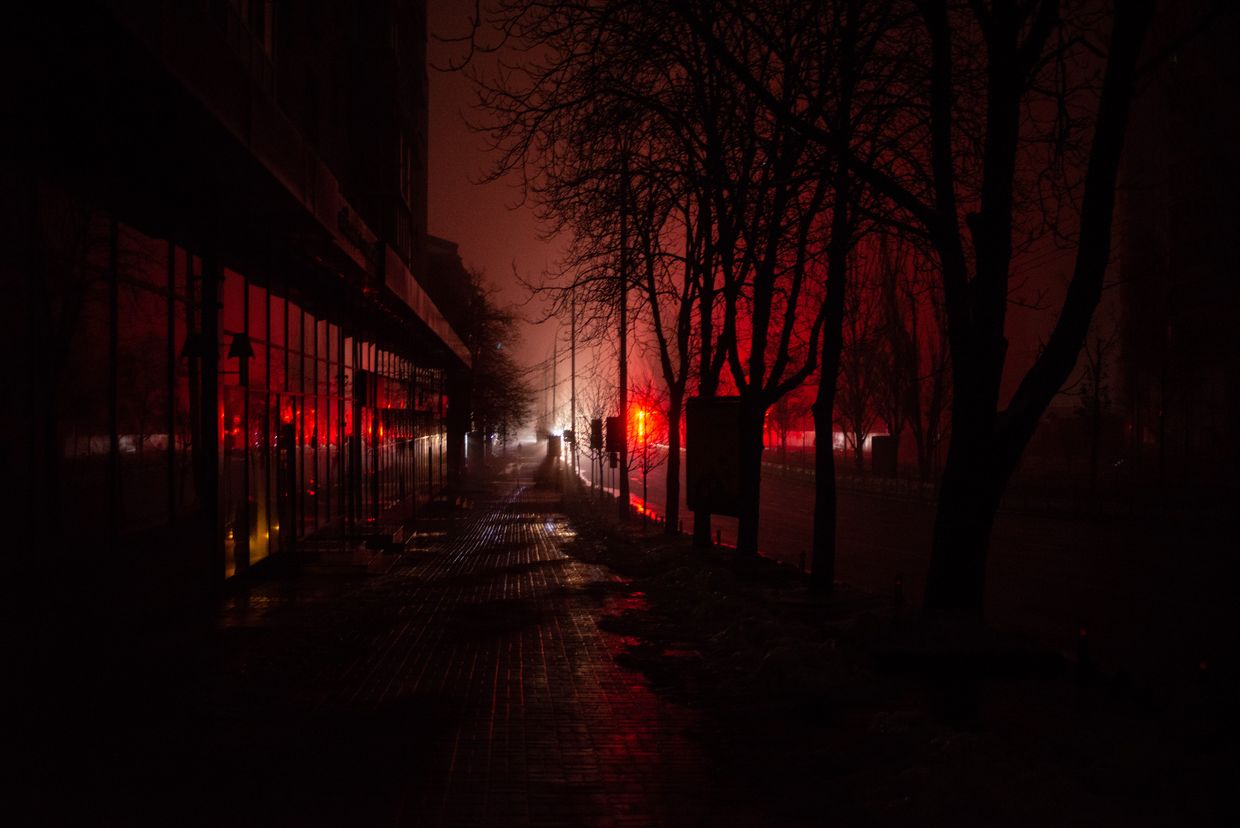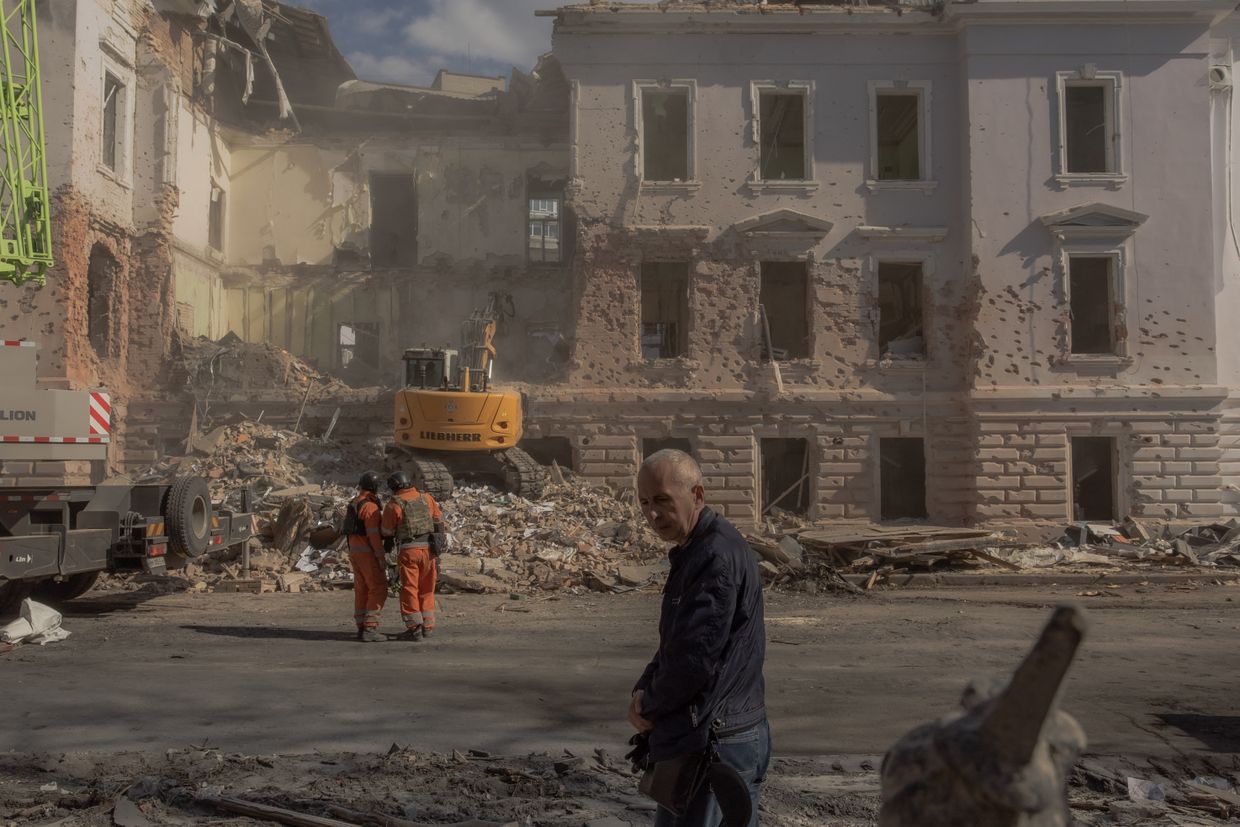Editor's Note: The Kyiv Independent is exclusively re-publishing an interview with Yevhenia Podobna prepared by Forum for Ukrainian Studies, a research publication for experts, practitioners, and academics to discuss, explore, reflect upon, develop, and transform international understanding of contemporary affairs in Ukraine. This platform is run by the Canadian Institute of Ukrainian Studies (CIUS) of the University of Alberta (Edmonton, Canada).
Yevhenia Podobna is a journalist, editor-in-chief of the editorial board of the “Suspilne” documentary program, military correspondent, writer, and media coach.
CIUS: How much has the field of journalism changed since the beginning of Russia’s full-scale invasion of Ukraine? What observations can you share as a scholar, professor, practitioner, and war correspondent?
Yevhenia Podobna: I will start by saying that there have been many changes. When discussing these changes, it is worth separating the Ukrainian and international contexts.
In Ukraine, channels that openly lobbied for Russian interests have already been shut down to protect national media space before Russia’s full-scale invasion of Ukraine. Nonetheless, even since then, the information field has changed a lot. Today, Ukraine does not have the same number of media outlets as it did before the Russian full-scale invasion. At the onset of the full-scale attack, in response to the government’s call, television channels were asked to pool their resources within the “United News” marathon framework. Some channels were not invited to the United News marathon, as they were the supporters of the opposition before the full-scale invasion. Channel 5, for example, was pushed to transfer their broadcasting to the Internet. Many other outlets were forced to reduce staff and volume of publications due to the fact that specific topics lost their relevance. Instead, bloggers, Telegram channels, and other similar social media channels have become very active, trying to take on the function of media, although these two means of mass communication function in very different dimensions.
Many Ukrainian journalists had to redefine themselves because the demand for generalists, as well as for narrow specialists, plummeted. Today, every journalist knows what a ballistic missile is and how it differs from an aeroballistic missile. The war became number one for everyone.
In the last years before the all-out invasion, we observed that some media reduced their coverage of the Russo-Ukrainian war to an absolute minimum, the situation then changed. For example, in the news programs of Channel 5, where I worked, there were three war stories covering the ATO JFO (Anti-Terrorist Operation – Joint Forces Operation). However, when many other TV channels delivered news, they often included only one war story, hidden between “more important” ones. The topic of war receded into the background because its active coverage led to a sharp drop in the ratings of TV programs. February 2022 then came as a watershed. The audience suddenly awakened its interest, started to read a lot about the fighting, and assertively sought information.
Paradoxically, it took the beginning of the full-scale invasion to become clear what it means to be a journalist and why this profession exists. In the first days of active fighting, informational chaos reigned. Nobody understood anything, and the audience received atomized news about someone seeing or hearing something somewhere. The enemy actively used this chaos as they threw in and spread misinformation and fake news via social media and Telegram channels. Regrettably, many people paid with their lives for such an absolute lack of media literacy.
Turning our attention now to the international context, many outlets started paying attention to Ukraine. They began to dig deeper and understand better what was happening. That change made me very happy.
It is also very important that the international journalistic community has become actively engaged in discussing professional standards. If one takes the broadest perspective, all journalists in the world have one reference system—their ethical standards. The general rule is to follow the BBC handbooks in this respect. At their very first lecture in every journalism program, students hear that pluralism of opinion should always be adhered to. Stories and articles in the media should always present the position of those who support something, those who oppose it, and those who remain indifferent. Unfortunately, during the ATO–JTO, I often faced condemnation of my professional activities. At international events, foreign journalists used to tell me and my colleagues that we were propagandists and scoundrels who purposely avoided covering the other side of the conflict. For me, this kind of accusation sounded like abuse of the profession. For me, there has always been a fundamental difference between the standard of presenting different positions and telling the truth. Evil must be called evil. All journalists must define for themselves whether they are routine communicators or socially responsible professionals. In addition to the fact that journalist stories and articles must meet the standard of pluralism of opinion, they also need to be accurate, up-to-date, and truthful. For me, no matter how unpleasant it may appear, the truth has always been paramount.
Toying with this standard of pluralism, many media outlets around the world became platforms for the spread of terrorist ideas and lies. For example, in one story, foreign journalists could show the Ukrainian side, with factual information, and representatives of occupied territories or spokesmen of the Russians, who would say that 200 missiles and 300 MRL shells killed 500 children of the Donbas. We had warned our foreign colleagues for eight years to be careful. If journalists deliberately spread lies, it was worse than if they did not adhere to the standard of pluralism. We used to ask them: “Why won’t you popularize Osama bin Laden’s ideas?” or “Why won’t you give a word to the Taliban or other extremist organizations, representatives of totalitarian cults? They are also on the other side of the conflict, just like the Russians.” Yet such discussions often led nowhere. Only today, when Russians themselves started hallucinating about mosquitoes as biological weapons, many foreign journalists understood that such things could not be broadcast. The world finally recognized that Ukraine was a victim and not a party to the conflict.
It seems to me that the most essential thing in journalism is to tell the truth and call a spade a spade. Otherwise, the media distorts the reality that it talks about. In turn, audiences far away from Ukraine do not understand the context.
In journalism, there is a rule that can roughly be phrased as “check three times, publish once.” According to this rule, each piece of news should be checked in at least three sources, preferably more. The information provided by the Ukrainian side can always be verified. Foreign journalists have the opportunity to go to the front lines and see everything with their own eyes, but this cannot always be done in the occupied territories. Thus, lies and fabrications from there are often broadcast simply to meet the “pluralism” objective and represent the position (no matter how dubious or suspect) of the other side.
Before the full-scale invasion, many foreign journalists had reproached us for not going behind the front lines and obtaining comments. They did not understand that Ukrainian journalists would have been imprisoned in the occupied territories, risking torture, rape, and beatings. Therefore, I am pleased today that many foreign colleagues acknowledge the blind spots in their standards.
I am also very glad that there has been a large influx of journalists to Ukraine recently who finally saw the war with their own eyes. Previously, they had reported about Ukraine from Moscow, where many international correspondents worked. They reported about Ukraine through the prism of Russian propaganda, in which they had been immersed for quite some time, even if they were good professionals and good people by themselves. When they started coming to Ukraine and had to hide in shelters from shelling and missiles, the quality and content of their materials changed significantly. They began to write more truth.
CIUS: What is the importance of information and quality journalism in Ukraine’s war effort?
Podobna: In the modern world, there is no such thing as a “pure war” or “noble war.” The medieval skirmish was very much contact-based: an army of knights stood against an army of knights. The side which could destroy more heavily armed opponents won the victory. Today, wars are no longer fought in such a way. Today, the informational component has become crucial. Before an assault, the military implements a measure called “artillery preparation”—when all available large-calibre weapons are fired at the target area into which the infantry enters. In fact, Russia works in the same way in the information space. First, it pours phenomenal volumes of disinformation, propaganda, and fake news into the target area and then brings in the troops.
The Russians have always invested a lot of money in informational preparation. They have produced hundreds of movies on themes of war. They meticulously readied the world and their society for aggression. In addition, their propaganda has always been very flexible. When the Russians arrived in Kherson, they discovered that the local people hated them and tried to shoot them down from behind every bush. They quickly caught wind and sought an effective communication strategy to silence the Ukrainians’ hatred. Thus, to change the public mood, they began to disseminate leaflets about the “future with Russia,” showing people in embroidered shirts.
In Volnovakha, where very heavy battles were fought, Russians entered the libraries in the first days of the occupation and threw away Ukrainian books. They like to abuse information, but they themselves are afraid of it. Russia is afraid of the truth like the devil fears incense. Therefore, the more truth there is in the information space, the fewer bullets there will be in the machine guns.
Read the full interview here.












